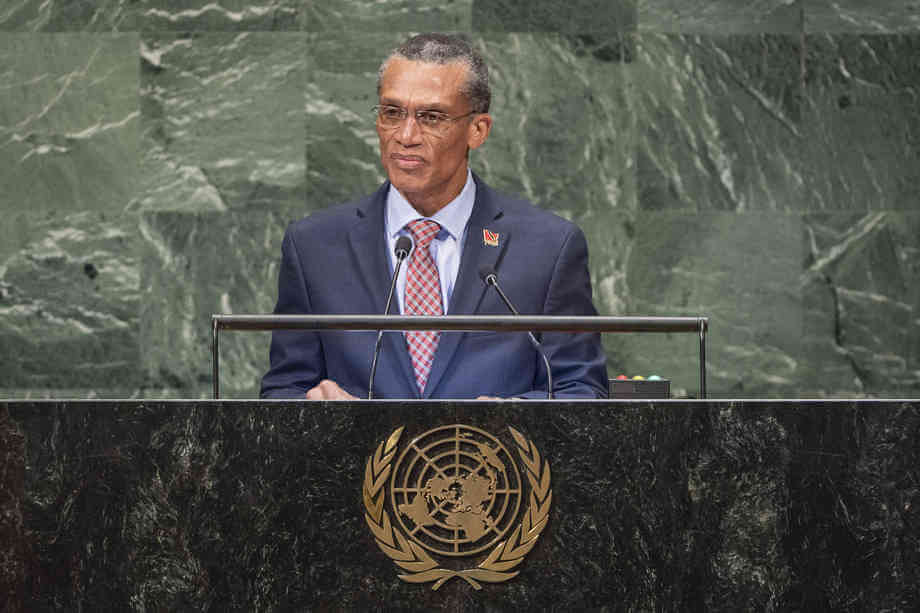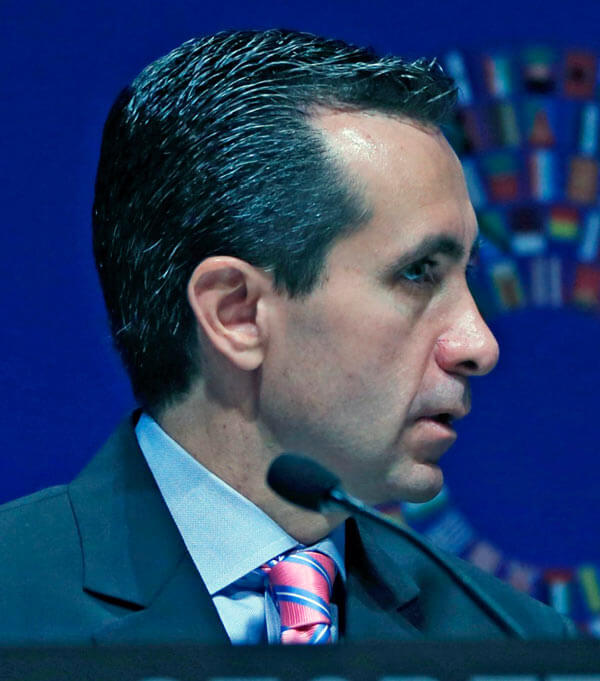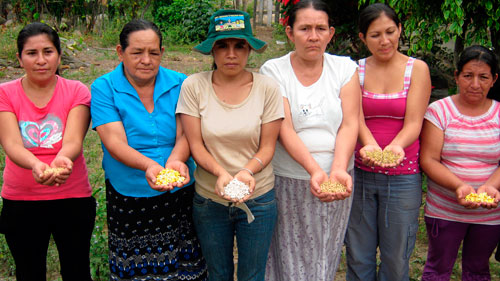Trinidad and Tobago says that the myriad multidimensional threats that litter the international development landscape threaten efforts toward universal sustainable development, the eradication of extreme poverty, peace and security and the enjoyment of fundamental human rights by all.
“The existential threat posed by unmitigated climate change and global temperature increase, the undeniable challenge of extreme poverty, violent extremism, gender-based violence, and the spread of new and infectious diseases is one that is best faced together, as Member States of the United Nations,” Sen. Dennis Moses, minister of Foreign and CARICOM Affairs, told the 73rd Session of the United Nations General Assembly Debate on Saturday.
“As the bastion of international peace and security, human rights, sustainable development and the rule of law, the United Nations, as an institution, is compelled to adopt a shift in its approach to ensure adequate, effective and efficient responses to the challenges of our time,” he added.
Moses said that it is on this basis that the government of Trinidad and Tobago reaffirms its support for the implementation of the UN Secretary-General’s reform agenda, in accordance with the relevant General Assembly resolutions.
But he said, “as we pursue the cost-savings and efficiencies associated with the reform agenda, it is imperative that we do not lose sight of the foundational principles, values and overarching objectives of this august institution.”
In this regard, Moses said he is reminded of the words of former UN Secretary-General, the late Kofi Annan, who “reminded us that, even though the United Nations is an organization of States, the Charter is written in the name of We the people.”
“Ultimately, this is the role of the United Nations: to serve the needs and hopes of people everywhere,” Moses said. “People must be at the center of our common endeavor.”
Having recognized this “infinite truth,” the Trinidad and Tobago Foreign Affairs Minister said his government, through wide consultation, developed a national development strategy, titled “Vision 2030.”
He said this multidimensional and inclusive development policy places “our people, our greatest resource, at the center of our pursuit of the sustainable development goals.
“If we are to truly ensure no one is left behind, it is imperative that we advance our efforts to ensure equitable access to opportunity and mobility for the most vulnerable,” Moses said. “Those who have long been left behind must now be positioned to participate in society as equals.”
He said the scope of the 2030 Agenda speaks to the wide range of issues that challenge global sustainable development.
Notwithstanding the global relevance of these challenges, Moses said it is widely acknowledged that asymmetries exist with regard to the impact of external shocks on Small Island developing States (SIDS), such as Trinidad and Tobago and the Caribbean region.
He said the Government of Trinidad and Tobago recognizes the Samoa Pathway as an essential component in the catalogue of development frameworks to specifically guide in the sustainable development of SIDS.
Accordingly, Moses said Trinidad and Tobago welcomes the San Pedro Declaration adopted at the Caribbean Regional Preparatory Meeting of SIDS in Belize, and looks forward to participating in the High Level Review Summit of the SAMOA Pathway in 2019.
Moreover, Moses said Trinidad and Tobago takes this opportunity to reinforce the principle that SIDS continue to be a special case for sustainable development, “given our complex and intricate challenges.”
As Trinidad and Tobago and its regional partners prioritize the unique threats to the development of their people, Moses said the UN 2030 Agenda provides “an important guide in our efforts to ensure that none of our citizens are left behind.
“In manifesting the intent of the Agenda, we have come to appreciate the importance of prioritizing the wellbeing of all of our citizens,” he said.
In this regard, he said Trinidad and Tobago and its Caribbean Community (CARICOM) counterparts are taking action to address the threat that high incidences of non-communicable diseases (NCDs) poses to the region.
“These diseases ravage our human resources, burden our healthcare systems and undermine our development efforts,” Moses said.
Since the adoption of the Port-of-Spain Declaration on NCDs by CARICOM Heads of Government in 2007, and the landmark United Nations High-level Meeting on the prevention and control of NCDs in 2011, he said Trinidad and Tobago has implemented a number of strategies for controlling and reducing NCDs.
Moses said the twin-island republic’s National Strategic Plan for the Prevention and Control of Non-Communicable Diseases 2017- 2021 aims to harness the collective efforts of both the public and private sector in respect of NCD prevention and control.
In this regard, he said the Government of Trinidad and Tobago welcomes the adoption of the political declaration of the Third High-level Meeting on the prevention and control of non-communicable diseases.
“We remain fully committed to addressing NCDs and to ensuring that it remains on the international agenda,” Moses said.
By raising the standard of living, improving the educational and healthcare systems, and providing equal access to opportunities, he said Trinidad and Tobago’s Vision 2030 is “actively pursuing the development of a resilient, equitable and healthy society that places all people at the nucleus of our sustainable development efforts.”
But Moses said no challenge is more pressing than that of climate change.
For small island developing States (SIDS) like Trinidad and Tobago, he said casting doubt on the scientific truth behind climate change “only serves to distract and to delay the urgent and ambitious action that is needed to confront the existential threat posed by global temperature increase.”
Earlier this year, Moses said the Government of Trinidad and Tobago deposited its instrument of ratification to the Paris Agreement, “thus formalizing its steadfast commitment to the principles and goals of the Agreement.”
As the republic’s national contribution to achieving the overarching objective of the Paris Agreement, Moses said Trinidad and Tobago has committed to reducing cumulative greenhouse gas emissions by 15 per cent from industry, power generation and the transport sector by the year 2030.
As a State Party, he said Trinidad and Tobago will be actively engaged in the negotiating process “to operationalize the Paris Agreement on a scale that will result in achieving the long-term temperature goal, and further limit the increase in global temperatures to 1.5 degrees Celsius.
“It is also hoped that the operationalization process will catalyze international cooperation on mitigation, adaptation and climate finance, to this end,” Moses said.
He told the General Assembly Debate that Trinidad and Tobago’s commitment to the Paris Agreement reflects the country’s overall responsibility to support international efforts to tackle shared environmental challenges, which include climate change, ozone depletion, land degradation, loss of biodiversity, illegal trade of wildlife and the movement of hazardous wastes.
“As a twin-island state, the conservation and sustainable use of oceans, seas and marine resources is critically important to the development priorities of Trinidad and Tobago,” he said. “However, Trinidad and Tobago is located in a region that is highly vulnerable to an unprecedented rate of loss of marine biodiversity and the impacts of unsustainable practices on the marine environment.”
Therefore, Moses said Trinidad and Tobago welcomes the First Session of the Intergovernmental Conference to develop a legally binding instrument under the United Nations Convention on the Law of the Sea on the conservation and sustainable use of marine biological diversity beyond areas of national jurisdiction.
The Trinidad and Tobago Foreign Affairs Minister said one of the pressing challenges facing the region is the cessation of correspondent banking relations, and the labelling of countries in the CARICOM region as non-cooperative tax jurisdictions.
He said this issue has “severely destabilized the financial sectors of the region without due consideration to the financial, human and technical constraints confronting our Member States.”
As a result, Moses said the region’s efforts to bolster its economic stability and effectively engage in the global financial system “effectively have been stymied to the detriment of our economic growth and progress.
“This has the potential to further erode the development gains achieved thus far,” he said.
In this regard, Moses said Trinidad and Tobago joins with other CARICOM Member States in in urging their international partners to “engage constructively” on this issue.





















